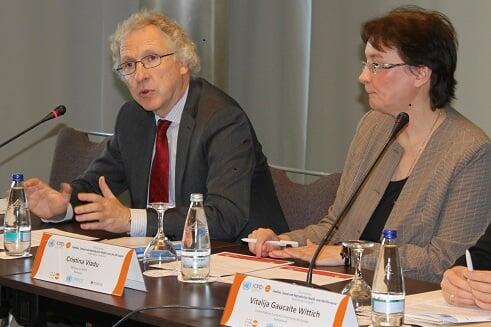BUCHAREST – Sexuality education in schools is key for improving sexual and reproductive health in the region, experts said at a two-day regional meeting organized by the UN Population Fund (UNFPA) and the UN Economic Commission for Europe (UNECE), which ended today.
“Unfortunately misconceptions about sexuality education remain widespread in many countries in the region, with many parents fearing that such education could lead to teenagers having sex sooner and more often,” said Werner Haug, UNFPA’s Regional Director for Eastern Europe and Central Asia.
“We have solid data confirming that the opposite is true: sexuality education helps teenagers delay sex and make responsible decisions about their sexual behaviour,” he stressed.
Sexuality education has been shown to reduce HIV infection rates, as well as abortion and teenage birth rates, due to increases in condom and contraceptive use among young people.
Participants also discussed the increasing diversity of family structures and compositions, and the health needs of the growing elderly population.
The experts warned that Eastern Europe and Central Asia is the only world region where HIV infection rates are still on the rise. At the same time, only 11 per cent of prevention investments are devoted to the population groups most affected, such as sex workers, people injecting drugs and men having sex with men.
“This colossal mismatch is a reflection of the powerful stigmas that some of the most vulnerable population groups are confronted with,” said Haug, highlighting the need to put the rights of individuals at the center of policy and programme development.
The expert meeting was part of a series of events leading up to a high-level regional conference in Geneva on 1-2 July, which aims to reach consensus on an updated population agenda for the region, two decades after world leaders adopted a Programme of Action at the International Conference on Population and Development in Cairo in 1994.



![Extracts from the United Nations Economic Commission for Europe Report on the implementation of the Programme of Action of the International Conference on Population and Development [Print] Extracts from the United Nations Economic Commission for Europe Report on the implementation of the Programme of Action of the International Conference on Population and Development [Print]](/sites/default/files/styles/webp/public/pub_homepage_cover/screenshot_2023-10-11_at_9.40.40_am.png.webp?itok=nxI6HFdv)

